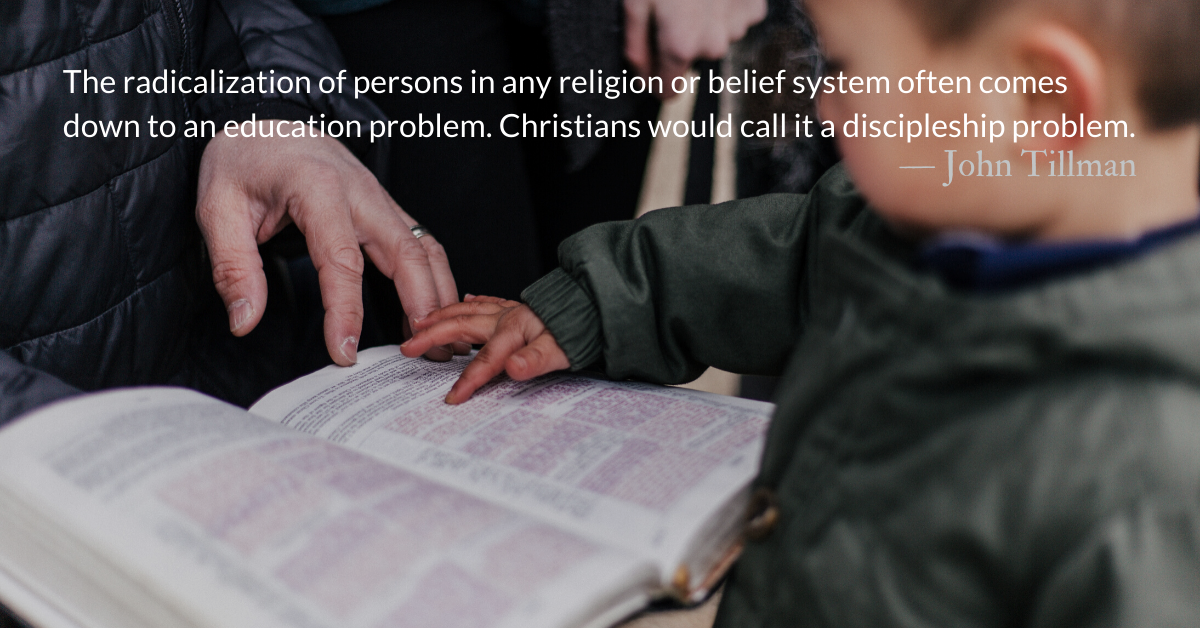Scripture Focus: Acts 17.4-5
Some of the Jews were persuaded and joined Paul and Silas, as did a large number of God-fearing Greeks and quite a few prominent women.
But other Jews were jealous; so they rounded up some bad characters from the marketplace, formed a mob and started a riot in the city.
1 Thessalonians 4.6
You became imitators of us and of the Lord, for you welcomed the message in the midst of severe suffering with the joy given by the Holy Spirit.
Reflection: Extremism as a Discipleship Problem
By John Tillman
Audiences have long been fascinated with extremism and the process of radicalization. In 2018 a TV series retelling events surrounding the 1993 raid that killed David Koresh and the Branch Davidians, served as a reminder that radicalization is not merely a third-world or a Muslim problem.
Radicalization has been imagined in fiction as psychological manipulation, as brainwashing, and as bribery. It has even been sympathetically redressed as the rational actions of those with legitimate grievances. But the radicalization of persons in any religion or belief system often comes down to an education problem. Christians would call it a discipleship problem.
Islamist terrorists such as, Sayfullo Saipov, who carried out a truck attack in Manhattan in 2017, are often motivated by a faith that in the end is little more than a political and ethnic identity.
After acts of violence from their members, many Imams and Christian pastors can be found saying some version of, “That’s not what we teach.” Whether these statements are true or not, they are a confession of poor discipleship which has far wider-ranging effects than the infinitesimal percentage of Christians (or Muslims) who resort to violent attacks.
Poor discipleship in Western faith is allowing Christianity to become little more than a political distinction and in some cases, a racial one. Our brand of moralism is a hair’s breadth off from the Pharisees of the New Testament. Like the Pharisees, we use moralistic interpretations of scripture to justify denying assistance to the needy. We are not ashamed to make embarrassing political alliances to ensure that we don’t lose our place of cultural influence.
We can find hope, however, in today’s readings in Acts. Though the Bereans are called “more noble” than the Thessalonians, it is the Thessalonian church that is more well known to us through the letters Paul writes to them. First Thessalonians is a joyful celebration of those who were left in a difficult situation, without Paul who introduced them to Christianity. (And without Google.) Yet through diligence, faith, and the guidance of the Holy Spirit, persevered and blossomed in faith.
Even in a culture dominated by a brutal empire, those willing to devote themselves to prayer, Bible reading, and connecting to the Holy Spirit, can not only survive our culture but continue the process of transforming it one life at a time.
Divine Hours Prayer: A Reading
Jesus taught us, saying: “Why do you observe the splinter in your brother’s eye and never notice the great log in your own? How can you say to your brother, ‘Brother, let me take that splinter out of your eye,’ when you cannot see the great log in your own? Hypocrite! Take the log out of your own eye first, and then you will see clearly enough to take out the splinter in your brother’s eye.” — Luke 6.41-42
– From The Divine Hours: Prayers for Autumn and Wintertime by Phyllis Tickle.
Today’s Readings
Nehemiah 7 (Listen -6:37)
Acts 17 (Listen -5:28)
This Weekend’s Readings
Nehemiah 8 (Listen -4:07) Acts 18 (Listen -4:06)
Nehemiah 9 (Listen -7:48) Acts 19 (Listen -5:47)
Read more about The Church of Acts
The clue Luke gives us is in the title—Acts. They will know we are Christians by our love. By our actions.
Read more about The Energy of Expectancy
The time of waiting is past. The light is here. The starting pistol has fired. The gate is open. The race has begun.






